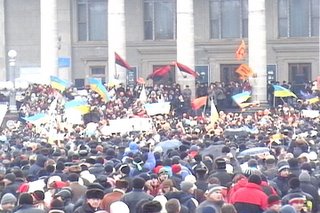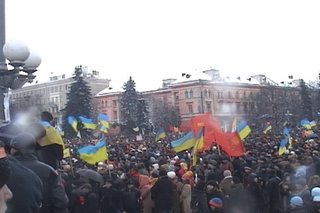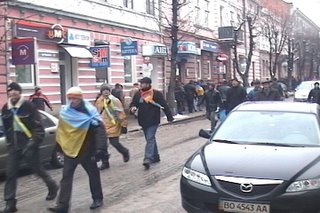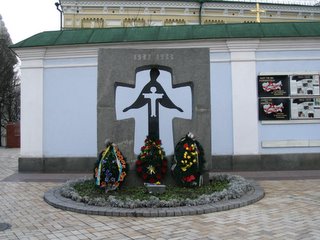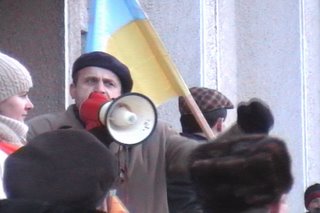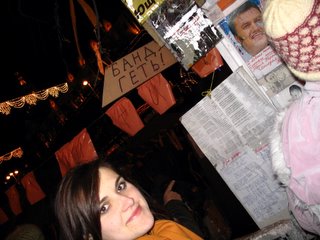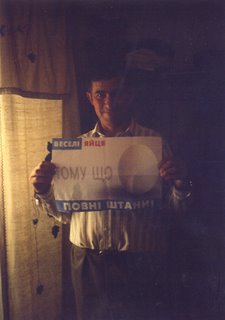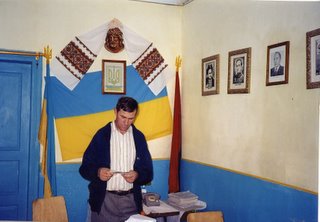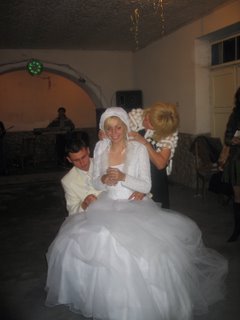Wednesday, November 30, 2005
Sunday, November 27, 2005
In Remembrance of 1933
My maternal grandmother was a little girl as the famine raged in, and many people dropped dead on the streets and paths of, her khutor not far from the city of Poltava (a hutor is a settlement smaller than a village; a hamlet).
Below is a photo of the "monument" to those who died in 1933 that now stands in Kyiv. It is beautiful, but I also find it rather disappointing.
Why is it so small in size? [Note: Monuments and memorials in the former Soviet Union tend to be rather grandiose; there is a reason for why this one is an exception.] Why is it located in such a discreet, inglorious place? That is, it is discreetly tucked away to the side of the St. Michael's Cathedral complex, on a busy plaza with other monuments around, and a lot of business going on. It is not a solemn locale, and the area does not force upon the viewer of this memorial a mood of shock, terror, terrible awe, rage, nor sadness. It is too busy. Too many people getting married on the square before it; too many people rushing about from one cathedral to the next, or quickly heading from one or both of the nearby Cathedrals down Desjatyna St. to Andrijivskyj Uzviz, etc.
7 million people were killed during this event. The Ukrainian-speaking countryside of central and eastern Ukraine was turned into a partially Ukrainian, partially Russian, and most definitely surzhyk speaking area, in large part due to this event. This was an event of enormous cost to Ukrainian culture. Something that shows the true magnitude of what was lost in 1933 should be in place. This is NOT it.
The statue itself is beautiful. Really beautiful. I want it reproduced on a much larger scale. Borrowing from the Vietnam Wall, I want a series of walls with 7 million dots or something in the place of the long-forgotten names (it will never be possible to get all the names) at the base of the enlarged version of this beautiful statue. I want an eternal flame. I want a chapel or prayer center, and places to light candle sticks, etc. I want to feel like I am entering a truly solemn and holy place, a place marking how close the nation came to loosing a chunk of its soul. I want to feel safe to cry there. I want to see people go there and cry or be contemplative.
In short, what I want is for Ukraine to become more truly open to its history.
Some words from my baba (from an interview I recorded with her in English with one of my brothers around, who does not know Ukrainian):
“We were called kulaks because we had it, two cows, and we kept the village tractor. It was decided over and over again that we should keep it, tractor, by people in our village. My father was man who knew fix it, and others would come him from other village to ask for help to fixing their tractor. But soldiers came, took everything from us. My mother, she tried to hide some food behind the stove (the large, clay-tiled stoves that function as a radiator for heat) but the soldiers, they just find it, and when they did, they beat my mother. . .jak I cried it! It was just terrible; I was so young, so young, but I remember it, everything. . .”
“We know our neighbor was eating the children. That’s what we thought. So my mother, she used to make us to go to cellar. We'd stay, all day; we only can come out at night, when there was no light in house.”
“The hunger was terrible, I remember how. . .jak we were children. You know, we would cry it and cry, and my mother, she did everything she could. There was soup of mice and rats and leaves, and just of anything. We all survived it, but other families, they just died.”
My maternal grandmother’s khutor was called Chetverylivka, and was not far from city of Poltava. It no longer exists. My grandmother’s maiden name was Chetverylo; her family, and my ancestors from her side, is most likely descendent from those whomever had founded the settlement, which probably was a Cossack settlement.
Just nine years later she would be kidnapped from her khutor and whisked off to Germany, where she initially worked as a slave (what is a “forced laborer” if not a slave?) in a munitions factory making bombs for the German war effort. She was later transferred from Germany to Belgium, where she was at the end of the war, working the land of German colonists in the area who nonetheless had treated her well.
Every step of the way, she had numerous brushes with death. To this day she is devote in her faith because she believes God watched her and protected her in her youth. I would like to take her someday to a real monument commemorating some of the things she suffered.
Holodomyr survivor, Ostarbeiterin, my maternal Baba: I want to tell you in commemoration of this day how much I love you, and how deeply I respect you, especially for the way you have preserved your ability to laugh and to make others laugh against the greatest of odds. You truly understand that life is beautiful. The magic you have in your soul touches everyone who comes into contact with you in the most profound of ways, and you have helped nourish within me that ability to keep sight of the light that will always be my guide. Thank you Baba Omaha (what my siblings, mother, father, and I call her because of where she made her life in the US).
Afterthought a day later: although there are those nutcases who claim that the famine did not even happen, or that it was not as completely devastating for the peasantry of central and eastern Ukraine as the historians of the holodomyr claim it was, most people agree that a famine did take place, and that a lot of people died to devastating effect on Ukraine. What they disagree on is how and why it happened. Nonetheless, whether or not you think that it was
a) a famine that was the accidental result of poor policies that, once it was underway, was taken advantage of as an instrument for the deliberate killing off and pacification of either a people or a class (which of course is another debate, whether the target of the killing really was "the Ukrainian people" as such, or more specifically peasants or an imagined class of peasants), or
b) a deliberately planned terror-famine or genocide from the start, or
c) was merely the result of poor policies that had horrifying consequences which nonetheless were not the result of the Soviet government having had turned the crisis into a deliberate genocide, or
d) was merely as the result of poor weather, etc.,
is not the point still that millions died tragically? Should this tragedy not, whatever one considers its causes to have been, be memorialized in any real or significant manner?
Making every fourth Saturday in November a day of commemoration is a huge step in the right direction.
And another note: I personally do consider it a genocide, or even better put it was linguicide, whether the intention was to kill off much of and to tame a nation, or more narrowly to kill off an imagined class. My grandmother says that she had very infrequently heard Russian before 1933. Officials and soldiers speaking Russian had been to their village, and she remembers not understanding them as a child. She also remembers that the amount of food her family was alloted in the months after the government decided to start feeding people again did not depend only on her parents' work on the newly collectivized land, but also on her and her older siblings' progress in Russian language lessons. She also recalls having a bar of soap stuffed into her mouth for refusing to speak Russian and thus for speaking only in Ukrainian at the school. She was a little girl then, in the heart of the Poltava region, where today many people speak a strong mixture of both Russian and Ukrainian instead of the pure Poltava dialect of Ukrainian that was still widely spoken in my grandmother's time, and which became the foundation for the literary language and the official national version of Ukrainian. 1933 transformed this countryside in the most brutal and unnatural of ways. There was no natural gravitation toward the Russian language; the history of this change is drowned in blood and tears. It was linguicide, if not also cultural genocide.
But Ukrainians should refrain from using the term "holocaust;" to my mind that term is best left in reference to what happened to the Jews of Europe. They deserve their own term. The holodomyr, although just as sinister in its engineering (I am of the a) persuasion as listed above) and massive and terrible, it did not kill off almost the entire population of Ukrainians as did the holocaust nearly killed off all the Jews of Europe.
Call them both genocides to acknowledge their similarities, but give them two different, specific names to summarize the specific differences, of which there are many. . .
The Significance of Nov. 26 in Ukraine
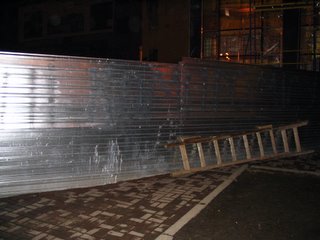
"No Compromise!"
The graffiti in this photo is hard to read; it was written on a wall blocking a construction site across the street from the Ukrainian Home in Kyiv.
In the end, people were willing to give Yushchenko the benefit of a doubt--at least he did not call off mass demonstrations, but just asked that no one do anything to escalate the situation (recall that just the day before, Moroz and Tymoshenko had suggested that the opposition may start erecting barricades around the city and might attempt to storm government buildings, etc., if authorities did not show any sign of cooperating with them). ARE PEOPLE AS WILLING THIS TIME to give him the benefit of a doubt? Or is the memorandum with Yanukovych (another compromise with Yanukovych) just far too compromising a compromise? To my mind, it seems like it is for most of his supporters in Ukraine, and so he has backed himself into needing Tymoshenko again. . .
November 26, 2005: Every last Saturday in November in Ukraine is the official day of remembrance of the holodomyr (the Terror-Famine that killed 7 million Ukrainians in 1933, and 1-2 million more in Central Asia). My maternal grandmother lived through the holodomyr, and I have over the years been recording her remembrances on tape, writing them down, and someday will seek to publish her words somewhere. See next post for more.
Then on a personal note, my paternal grandfather died on this day in 2002, 1 ½ years before I would come to Ukraine for the first time. It was amazing to be in Ukraine last year, on the two year anniversary of his death on a day in which I was able to actively participate in what can be thought of as the Great Awakening of the Ukrainian people--the realization of which he had dedicated his entire life. He was an active supporter of OUN/UPA as a young man in Ukraine; he then dedicated his life in the US to raising money to actively fund and support various institutions and organizations struggling for Ukrainian independence and freedom; and in his final years, he funded construction of three Greek-Catholic churches (one, in his home village of Sil'tse, for which he was the sole funder; another in Pidhajtsi for which he was the principle funder; and another church in L'viv to which he donated, but was not the principle funder). I wonder what he would have felt, had he been alive to see me go to Ukraine and experience the OR, and I wonder what he would think about the situation now, one year later.
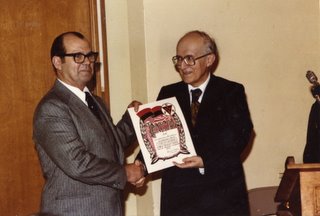
Mykhailo Iwaskewycz (on left) Recieving Thanks in the mid-1980s
Tuesday, November 22, 2005
One Year Ago, Day 1 of OR: Berezhany Photos
You can read what I have written about that day here (scroll down to post, "The Orange Revolution in Rural Ukraine: Part I, Berezhany) and here (post entitled SENT NOV. 22; more photos over there, at the bottom of the post).
Below are stills from my video footage of that day one year ago:
 Procession begins from the center of town to the county administration building not far away, where a daily picket took place throughout the OR. Please take note of the mixure of happy and angry faces in these photos. . .
Procession begins from the center of town to the county administration building not far away, where a daily picket took place throughout the OR. Please take note of the mixure of happy and angry faces in these photos. . .
 Procession to the county administration building
Procession to the county administration building
Angry shout of "Shame! Shame!" The whole crowd joined in, and you could feel its collective anger, frustration, and rage resonating in your bones and sinews.
Man happily saying to my camera, "It looks like we won't let them get away with it this time! Shame on them!"
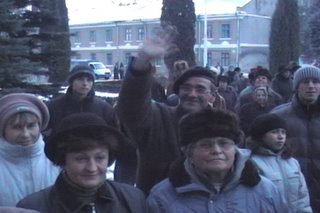 Above and Below: People feeling empowered. The OR, whatever the critics of it say, was the beginning of a sense in Ukraine that the people can put their hands on the levers of power, if they are organized. Whatever reasons the US had to back the pro-democracy movement (there were plenty of self-interested reasons for it to do so), it could all backfire, or not work out for the US. There is now a solid grassroots movement in Ukraine that, having been baptized by fire during the OR, continues to be a thorn in the side of the authorities--who now are those of the YuGov. One year ago was about the Ukrainian people, more so than the Grand Chessboard.
Above and Below: People feeling empowered. The OR, whatever the critics of it say, was the beginning of a sense in Ukraine that the people can put their hands on the levers of power, if they are organized. Whatever reasons the US had to back the pro-democracy movement (there were plenty of self-interested reasons for it to do so), it could all backfire, or not work out for the US. There is now a solid grassroots movement in Ukraine that, having been baptized by fire during the OR, continues to be a thorn in the side of the authorities--who now are those of the YuGov. One year ago was about the Ukrainian people, more so than the Grand Chessboard.
B-t-w,Leopolis, from whom I got the YuGov coinage, has done a good job of pointing all this out, too, in some excellent posts to his blog:
1) here and scroll down to the post whose title begins "american felt boots, drugged oranges, . . .etc."
2) here, the first post at the top
3) And read here (first post again) for general commentary on the matter of what I label Whose Revolution Was It?
In general, most of his posts from the days of the OR last year are quite interesting (I personally didn't know anything about blogging at the time of the OR, so I am myself just now catching up on some homework. . .)
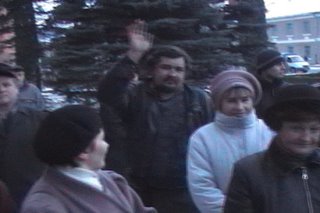
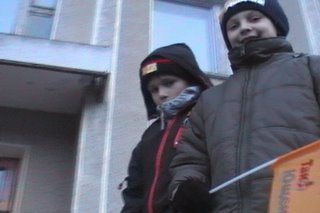 Kids on the stairs to the country administration buildings. . .they called me up to them
Kids on the stairs to the country administration buildings. . .they called me up to them
 The view from the kid's spot on the stairs
The view from the kid's spot on the stairs
There were about 6 or so kids standing there, all holding eggs, all waiting for the head of the county administration, the man responsible for the falsified vote in the Berezhany county, to come out!
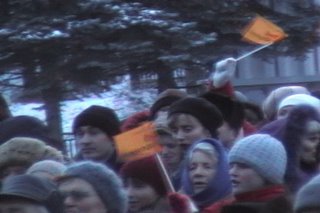 Singing "Shche ne vmerla Ukrajina," the national anthem, as the demonstration ended. The plan was to retun the next morning at 7:30 AM, so that the picketers would be there for the start of work day.
Singing "Shche ne vmerla Ukrajina," the national anthem, as the demonstration ended. The plan was to retun the next morning at 7:30 AM, so that the picketers would be there for the start of work day.
Monday, November 21, 2005
Reflections on This Day One Year Ago
I recall that it was a restless sleep for me. And I remember Oksana telling me the next morning about bad dreams, but I don't remember their content. It was before 8 AM when I got out of bed, not being able to sleep anymore, and went back to the radio again. She was already hunched before it, listening with a look of disbelief.
Oksana has recently told me that last year, in the days before the Nov. 21 election, she had led herself to believe that the authorities would cooperate with the people. She said that she knows that it was a bit loony to think so, especially in light of the budget worker scandal that occured that week; however, she said that at the time, she had to believe. She had to believe in the possibility of a Yushchenko victory. She had to believe that the real lunacy was going to come to an end. . .
I remember asking her how she felt after she voted that day--last year, Nov. 21. She said something like, "Proud, like I never have before; proud of my country, or something like that; I don't know. . ."
I will be writing much more about him in the coming days. He was head of the Fatherland Party (Tymoshenko's party) in Pidhajtsi, and organized many buses to Kyiv from Pidhajtsi during the OR. The photo below is of him in the Fatherland Party's office in Pidhajtsi. . .
Hryts, Dmitri Shkvarlo, and I Putting Up Posters Between Election Rounds in Early Nov.
Hryts, as it turned out, left to be an election observer somewhere in the state of Donetsk. He came back late the next day to tell us the story of how he filmed a man being allowed to vote a second time, and how, as he filmed, security guards forcefully removed him from the voting center, throwing him out the door with such force that he fell to the ground. As he laid on the ground, they threw the video camera he had with him (property of Our Ukraine) to the side of his head, smashing it. Luckily, the guards were not smart enough to take the tape out of the camera. Hryts dutifully turned over that tape to the Our Ukraine offices in Kyiv, perhaps that tape became one of the 11,000 bits of evidence of electoral fraud that Yushchenko's lawyers submitted to Ukraine's Supreme Court, in effort to prove that the election had been massively falsified in favor of Yanukovych.
Oksana's mother and brother did not come home until the very early morning hours on Nov. 22. They worked in the voting center in Pidhajtsi, and they were involved in the vote counting and also, in watching for and guarding against any effort to falsify the vote or to provoke a scene. There were pro-Yanukovych observers in town, and also, Yanukovych was alleged to have had boasted that he would get 10-12% of the vote, "even in Pidhajtsi." Pidhajsti had the highest number of votes for independence in 1991; the highest number of votes for Kuchma (v. Symonenko) in 1999; and the highest number of votes for Yushchenko in the first round in all Ukraine. It would go on to have the highest number of Yushchenko votes in the runoff and in the rerun of the runoff. (The Kuchma vote in 1999 was mostly an anti-Communist vote.) Pidhajtsi is known, by those in-the-know, as one of Ukraine's most uppity towns. So there was fear that there would be attempt to falsify the vote there. In the end, all went well and peacefully. . .in Pidhajtsi, at least. . .
But not throughout Ukraine. I remember the. . .excitement? No, the relief I felt when they said that about 100,000 people had gathered on Independence Square in Kyiv this night one year ago, and that there were tens of thousands gathered in central Lviv, and thousands more in towns and cities throughout Ukraine.
There was so much going on emotionally in people that night, that I could sense as I went around to other people's houses to drop in and say "Hello," etc. There was rage, shock, excitement, and pride. I wrote an email that night from Pidhajtsi entitled, "Ukrainians Willing to Fight!" which you can read here.
It was incredible to be there to witness what could perhaps be called the Great Awakening of the Ukrainian people, to witness something that my grandfather--born in a village neighboring Pidhajtsi and who had died two years prior to the OR, at the age of 91, on the morning after his birthday on November 26--had struggled for his entire life.
Saturday, November 19, 2005
Reminder of Why Yushchenko?
Here are two paragraphs that really served to remind me:
"In response to an attack from Yanukovych, who claimed that Yushchenko was responsible for the dismal state of Ukraine's treasury due to his policies as PM, Yushchenko said, 'You should have seen the state the treasury was in when I began my government as PM—you’re lucky that I was there before you,' and emphasized how he was able, as PM, to raise funds to pay pensions and wages that were months overdue (unpaid because the government was broke), and to make a start on paying Ukraine’s foreign debt. He went on to discuss how the ongoing problems of the treasury have nothing to do with anything he did, but with the lasting effects of the banditry of a government of corrupt oligarchs who used money from the treasury (as well as from elsewhere) to buy state-run businesses and industries during privatization, and who often bought these businesses at only half their value; and who has spent money on fancy cars and luxuries for itself; who has spent state money on fixing up some of the infrastructure only in those parts of Ukraine where they, as oligarchs, are powerful; who have spent money on fixing up government buildings where they work; and who have spent money on plenty of other corrupt shenanigans that have resulted in the widening of the gulf that exists between the people and the government, such that that gulf arguably is bigger today in post-Soviet Ukraine than it was even in Soviet times, etc."
"Janukovych also tried in various ways to present himself as a populist: he did so only partially by trumpeting the alleged successes of his government. But we will see that he highly politicized these successes in effort to make Jushchenko seem like he didn’t care about issues dear to the heart of say, Russians in Ukraine. Janukovych and everyone else like him are desperate to split the vote, to generate false divisions within Ukraine’s electorate by manipulating Ukraine’s multicultural situation, to split Ukrainians against Russians, to divide and rule. Jushchenko is at his most humane, most eloquent, and most passionate when he discusses the false divisions of the Ukrainian citizenry, and how he wants to build a pluralist, multicultural Ukraine for the benefit of all—for no doubt, Janukovych’s policies will in the end be just as harmful economically to Russians as to Ukrainians, because in the end we’re not dealing with purely issues of culture. In fact, we’re really dealing with a pluralist candidate who wants to help everyone in his country versus a candidate who politicizes cultural divisions in an effort to maintain the rule of a fantastically wealthy and corrupt oligarchy at the expense of everyone else, whether Ukrainian or Russian, or Tatar, or Jew, or any other minority. Everyday people care most of all about bread, and while Jushchenko talks about it in universal and pluralist terms, it's Janukovych who tries to force people to think in terms of khlib (Ukrainian for bread) or khleb (Russian for bread)."
Read the whole thing here. . .
Throughout the OR last year, I was fond of using this trope of bread in my writings, especially in reaction to those articles that really liked to make a big deal of the idea of a very deeply divided Ukraine; for example, I frequently wrote things like:
"The fact of the matter is that while both Yushchenko and Yanukovych have Russian-speaking and Ukrainian-speaking supporters, the majority of the people in this country, i.e., those who have voted for Yushchenko, have realized that while Yanukovych et al encourage people to think in terms of either khlib or khleb, they are preparing to continue stealing the dough as they have been throughout the post-Soviet era."
Wednesday, November 16, 2005
One Year Ago Today in Ukraine: Protests Against The Budget-Worker Scandal
I was in Pidhajtsi at the time, and I recall watching an interview on the evening of November 16, the day before town hall meetings and pickets were held, with a manager of a state run plant on 1+1, the state TV channel that up until the OR was mostly a shameless propaganda forum for Yanukovych et al. This manager, in the state of Lutsk, was just talking away, saying mostly nonsensical things, and I recall how he reminded me of Leonid Kravchuk, who if you know what I mean, is a master at talking, and talking a lot, while saying absolutely nothing. This manager had this slippery-slick feel to him, but his cunning was not quite on par with Kravchuk. To paraphrase, I remember him saying something like, "You know, its natural; there are some parties planned for that day that people want to get to, and people want to be with their families on election day, etc. Some of my people even asked me for this favor. . ." Really? He was a really bad liar. And then I recall some interviews with workers at his plant, who were all camera shy or were too frightened to say anything real. This was still pre-OR, mind you.
I was stunned. I recall looking at Oksana, who I have featured on this blog a number of times, asking her once again the same question I had asked so many other times, in reaction to the shenanigans of Ukraine's authorities and oligarchs: Is this real? She said, "Stefan, this is our. . .your Ukraine. Can you believe it?"
The next day, Oksana's father, Hryhori Kolodnytskyj (from now on, Hryts K), who is my father's cousin, came bursting into the house at lunch time to tell us that there would be a town hall meeting in the very same Narodnyj Dim that I wrote about here last week, and that was featured in last week's Ukrainian Weekly. The meetings was being held in order to discuss what action could be taken to stop this obvious plan to falsify the elections. Hryts K, by-the-way, was head of the local branch of the Fatherland Party of Yulia Tymoshenko; he later organized four buses to and fro Kyiv during the OR, and spent himself more than 10 days in the capital. He also spent the previous summer canvassing for Yushchenko in and around the Pidhajtsi area (and I went with him on occassion). Hryts has a long, personal history of fighting against corruption and authoritarianism in Ukraine, a history that includes a run-in with the KGB in the 1970s that left him in a hospital for a month. (The OR did not happen in a vaccuum, and the US did not make it happen.)
These are still-photos I have taken from my video footage of that meeting in Pidhajtsi.
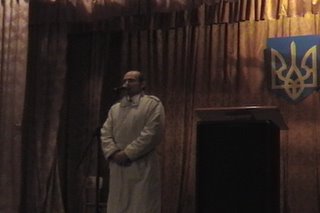
This is Petro Dmitrovych Kalynjak speaking. I wrote about him here just the other day. He opened the meeting by making a call that something be done to stop this attempt at falsifying the elections. If you read what I wrote about him, you will see how there is continuity between the events of the OR and those of Ukrainian history in general. Continuity. No Vacuum. The US did not suck up a bunch of dimwitted villagers and unthinking city dwellers into unwittingly doing its bidding. . .
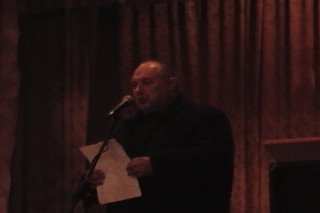 I forget this fellow's name, but he is reading to the assembled the order that budget workers should turn over their right to vote to their managers.
I forget this fellow's name, but he is reading to the assembled the order that budget workers should turn over their right to vote to their managers.
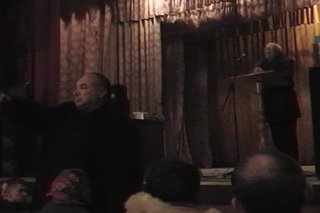 People got excited as he finished his speech, in the course of which he had said he has a list of names of people who already had turned in their registration and passports. He did not want to read out the names, but people in the crowd started shouting that they wanted to know the names.
People got excited as he finished his speech, in the course of which he had said he has a list of names of people who already had turned in their registration and passports. He did not want to read out the names, but people in the crowd started shouting that they wanted to know the names.
The man standing at the podium, by the way, is Mr. Metyk. I forgot his first name, but he is a linguist who speaks, of the Slavic languages, Ukrainian and Russian of course, but also Polish, Czech, and Slovak; then he also speaks very good English and German, as well as French and Spanish. I chatted with him frequently in my days in Pidhajtsi in the two of his 7 extra languages that I know other than English and Ukrainian--i.e., in German and Spanish--in which he was much more fluent than I. He's never been west of Ukraine. He has a gift for accuracy, whereas I have a gift for making lots of mistakes and still being understood in the languages I know in addition to English (I have knowledge also of Latvian and Russian). This includes my Ukrainian, which nonetheless is becoming better and better all the time. . . Mr. Metyk is dieing of a heart condition for which he needs medicines that he has no money to buy, and no family abroad to help him out. His speech on this day was about the dismal state of medical care and of the infrastructure in general in Ukraine, and on the need to prevent Yanukovych from winning. Read here what I have written about the infrastructure in Ukraine.
 This woman standing in the background wanted to know the names so that she could go and picket their houses.
This woman standing in the background wanted to know the names so that she could go and picket their houses.
 This is Hryts K speaking. He made a call for everyone present (maybe 200-300) to join him in a picket at the police station and at the county administration. Immediately after the meeting, he and others proceeded to the pickets. The footage of their picket in front of the police station (a large # of police had already turned over their right to vote) is on cassette #11, the only one missing from my box of footage from last year in Ukraine. I have searched for it frantically all day. Where the hell is it?!
This is Hryts K speaking. He made a call for everyone present (maybe 200-300) to join him in a picket at the police station and at the county administration. Immediately after the meeting, he and others proceeded to the pickets. The footage of their picket in front of the police station (a large # of police had already turned over their right to vote) is on cassette #11, the only one missing from my box of footage from last year in Ukraine. I have searched for it frantically all day. Where the hell is it?!
Many cities, towns, and villages had similar responses. The uproar was so great that a day or two later, Ukraine's parliament, the Verkhovna Rada or Supreme Council, passed a resolution that aimed at preventing managers from voting on behalf of their workers, as well as providing some provisions that aimed at making it more difficult for people to abuse the system to vote more than once, as they had done in the first round. However, the resolution was not binding; I forget the legalities of the whole thing, but recall only that the resolution was not passed into law before the election.
Although authorities were probably still able to use this method to falsify a good portion of the votes, in general people felt emboldened not to go along with the plan by the protests and the parliamentary resolution. Budget-workers, by the way, make up a large portion of Ukraine's work force, from those working within the government bureaucracy to those in state-run industries, especially in the publicly-privately run utilities, etc. The electricity plants that supply the Pidhajtsi region are partially owned by Surkis, one of Ukraine's wealthy and powerful oligarchs, and partly by the state; who do you think the managers would have been voting for?
I recall that all of this made me feel, at the time, two things: 1) I now felt, along with everyone else, absolutely certain that authorities were planning to repeat all their pitiful shenanigans of the first round of voting on Nov. 21; and 2), more importantly, it made me feel that this time, Ukrainians just might fight for their future.
Read here an article I had published in a local Minneapolis newspaper on this day that protests against the budget worker scandal broke out. . .
And one last thought: One of those bastards writing for the Guardian from their armchairs (not from the ground in Ukraine), either John Laughland or Jonathan Steele, had the gumption to, not just speculate, but to confidently claim, that Yushchenko would have done all the same things to falsify the elections had he been in Yanukovych's place. Oh really? I think that the writer (either Laughland or Steele) is himself cynical enough, on par with Medvedchuk, the mastermind of the whole falsification regime, to have done the same in the same shoes; however, when it comes to Yushchenko, although there is much to criticize him for, this claim makes no sense at all, when you look at his personality and personal history.
This makes me think of the statement made by a taxi driver I had in Kyiv this past trip. His name was Bohdan, and he had lived in the US for 12 years and spoke excellent English. He asked me what I was doing in Ukraine, and I told him that I was making a documentary that was in part an answer to the critics of the OR who claim that, more or less, Ukrainians were the unwitting stooges of Western machinations. He asked me what a "stooge" was, and after I explained, he said back to me, "Well, I think that such people are the stooges of their own ideologies. . ." He was an educated fellow who had read Western philosophy and had trained to be an engineer oh so long ago, another one of those fabulously interesting cabbies I have shared time with in Ukraine (another was an anthropologist cabbie in Ivano-Frankivsk who talked on and on about the castles of Halychyna. . .).
I begged him to let me film him saying this, but he declined my repeated requests by saying that he was just a taxi driver. . .
Monday, November 14, 2005
On the Road to a Documentary, III: Tradition
 (still from video)
(still from video)"With us, corruption is a tradition. It is deeply embedded. It is a sickness like leprosy that eats away slowly at the body, and most of Ukraine has been sick with corruption for a very long time. Where there was Russian rule before the Soviet Union, it is even worse. But the communists were terrible for the whole country. They brought corruption here [to Western Ukraine] to the point that it is a terrible problem here too. It will take time for things to change. They didn’t [change] after the collapse of the Soviet Union, and we needed a revolution to get things moving finally in the right direction. We are truly now in the evolutionary phase. The Orange Revolution was a break with the past, and about what people say about Yushchenko today, that he is just the same as the old powers. . .I think he has done the right thing; it is good that people who continued to work in the old way, for their own interests, are out of the government now [from earlier comments, it is clear that he meant both Tymoshenko and Poroshenko]. Ukraine is changing, but it will be a long and slow process. . .”
-Petro Dmitrovych Kalynjak, official in the county government of Pidhajtsi; also, was head of Yushchenko’s campaign headquarters during the election and is current head of the local branch of the People’s-Union Our Ukraine (Yushchenko’s political party) in Pidhajtsi. He has been an active part of the anti-corruption, anti-oligarchy opposition movement since at least 1998, but he also played an active role in the same movement in the late 80s and early 90s. That is, the Soviet state was also dominated by a click of corrupt and authoritarian politicians, and opposition to corruption and authoritarianism, be it of the communist or post-communist variety, has a long history in Ukraine.
Mr. Kalynjak is an example of the continuity between then and now
The OR did not happen in a vacuum. The US did not come here with big money and flashy PR tricks to dupe simpleton villagers and unthinking city folk into voting for Yushchenko and into unwittingly participating in a “revolution” that served mostly American interests.
What about what Ukrainians themselves wanted? Whose interests were served? The answers are not as black and white as the critics want them to be. . .
The question critics of US foreign policy should ask about the revolutions in Yugoslavia, Georgia, and Ukraine is this: What is to be done when the US for its own geopolitical reasons actually sides with the people—i.e., the poor and the critical mass of the angry—in their struggle against corruption and authoritarianism? The answer should not involve denying the authenticity of those people’s movements, or begrudging the grassroots activists of a poor nation for accepting whatever money they could get hold of.
The OR was not about Yushchenko. It was about a whole lot more, and it is making a positive difference in Ukraine today.
Thursday, November 10, 2005
On the Road to a Documentary, II
But it also will be easily viewed merely as a reminder of why people in Ukraine finally had had enough with the corrupt post-Soviet oligarchy, and of what they were struggling for in the first place last year.
I want to have it done in time for the parlaimentary elections, and there will be both English and Ukrainian versions.
So far I have interviewed professors from Lviv and Kyiv; activists, students, journalists, government officals, and businesspeople from Pidhajtsi, Lviv, Kyiv, Kharkiv, and elsewhere; ordinary people from various places; editors of the journal Ji based in Lviv; etc. I hope to go back to do more interviews soon, after the Holiday season, depending on financial resources. . .
So I will be posting little aphoristic pieces, with photos and stills from video, on this blog as I begin the post-production editing and piecing together of the film. These will be meditations as I piece the doc together. . .
This, by the way means that I am back in Minneapolis and am working with a Canadian friend with Ukrainian heritage (from Zhovkva, near L'viv) on the editing.
On the Road to a Documentary, Part II: Neglect
 The Collapsed Top Two Floors of the Local Gymnasium in Pidhajtsi
The Collapsed Top Two Floors of the Local Gymnasium in PidhajtsiRead here for the accompanying text
Photos: A Wedding in Pidhajtsi
Something politically neutral about Pidhajtsi: Photos of a wedding last September. Enjoy.
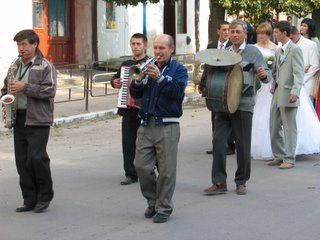
The wedding band and procession: There is always a procession through town from the bride's home to the Church for the wedding ceremony. The band can also play at the reception, but there is also the typical synthizer-clad singer available for hire in Pidhajsti, too. . .

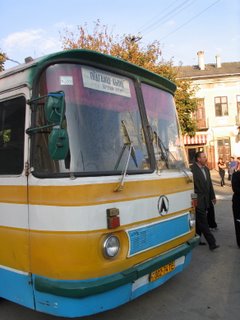 The bus to the reception in a great restaurant in a village not far from Pidhajtsi. Also, this bus this part of Pidhajtsi's connection to the greater world, as it runs daily to Lviv.
The bus to the reception in a great restaurant in a village not far from Pidhajtsi. Also, this bus this part of Pidhajtsi's connection to the greater world, as it runs daily to Lviv. How the table typically looks for any major event. . .
How the table typically looks for any major event. . .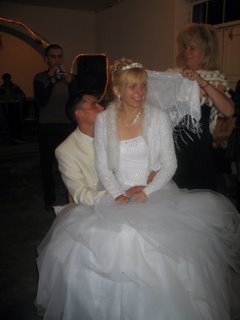 Above and below: Becoming a "woman. . ." Traditionally, it takes getting married. . .
Above and below: Becoming a "woman. . ." Traditionally, it takes getting married. . .
Since this was the wedding of Oksana's best friend, here they are dancing together. . .
Wednesday, November 09, 2005
Ukrainian Weekly Article about Pidhajtsi!
The Ukrainnian-American diaspora and English-language publication The Ukrainian Weekly has a piece about Pidhajtsi on its front page this week! The article is about efforts to restore the town's Cultural Center (I prefer to translate Narodnyj Dim as Cultural Center) and a plan whereby the State would pay for 95% of the project--locals will have to come up with 5% of the cost for the renovation. Read the full article here.
Here is my response to the article that I am sending (in a more edited and scaled-down version) to the weekly:
I was very pleased to see the article, published on the front page of your paper, about the town of Pidhajtsi in the state of Ternopil. I was born in Minneapolis, the grandson of Maria and Michael Iwaskewycz, who were born in the village of Sil’tse near to Pidhajtsi, and who funded the construction of a new Catholic Church in their village and another in Pidhajtsi itself. I was in Ukraine from the spring of 2004 to the spring of 2005 and experienced first hand the Orange Revolution, and I recently returned for another three months to work on a documentary entitled, Whose Revolution was It?: The Orange Revolution One Year Later.
The infrastructural problems in Ukraine are vast and bewildering, and the state of decay of the Cultural Center in Pidhajtsi is a case in point. It is very good that money is being raised to improve this building; and although it is natural that people should want to see improvements to public places such as this center and to Churches, there are many more pressing infrastructural needs in Pidhajtsi. That is, Pidhajtsi offers an even more significant, and terrible, example of these problems of infrastructural neglect and decay that so plague much of Ukraine: Last year, just before the first round of presidential elections, a portion of the top two floors of the three-story gymnasium collapsed. Only pure luck determined that this happened on a Saturday, with no students in the building. Some reporters from the Western Ukrainian press came to Pidhajtsi at the time to make this point, asking: What if? What if it had happened on Monday? This of course was already on most people’s minds in Pidhajtsi, and at the time many explained to me that, “We know our buildings are old; who does anything for them?” Any viewer watching the report in Ukraine could easily have recognized in this an example of the general neglect everywhere in Ukraine.
Post-Soviet authorities in Ukraine have been utterly careless regarding the people and neglectful of their duties to them. A huge gulf has separated the narod (the people) and the government functionaries, and it is the same at the local level as it is at the top levels. Money has been allocated for infrastructural repair and maintenance, but has disappeared. Roads are ordered repaired, but only the bare minimum is done, as a chunk of the allocated funds lands in someone’s pocket. The roads in Pidhajtsi are just short of a total catastrophe, and people know it. Some weeks before the Orange Revolution, I met an old man walking down a steep and deeply rutted road late on a night with no moon, and the street lamps are never lit at night: Is it due to budget cuts, lack of funds, or corruption? Who knows. He was having a difficult time managing, and as I began to help him along, he thanked me and complained bitterly that we should go together to take the city mayor, “by the balls until he does something [to fix the road].” A very common question in my months in Pidhajtsi was, “So, what do you think of our roads!?” Occasionally one can spot a bumper sticker, usually placed on Western-made cars, that reads “I WANT TO GOT BACK TO EUROPE.” Ukrainians joke about their roads because they know their roads are a joke.
People were, and still are, angry. Water pumps and pipes, electric power lines and transformers, etc., all remain old, worn-down, and are prone to breaking down. Many times in Pidhajtsi, both before and after the revolution, there was no water on our street, either because a number of people had not paid their bills and the water was deliberately shut-off (the jointly, privately-publicly run utilities still assign collective responsibility), or because a pump had broke. This was the case just this past August and September; for at least a third of this time no water ran to houses. People had to haul water home from public wells.
In Western Ukraine especially, the whole of the infrastructure chugs along with the help of band-aids and knee braces, and only the occasional cup of coffee keeps these senior citizens running. They should all be retired and younger ones put in their place.
The Orange Revolution has been hailed as the birth of a Ukrainian civil society that fills in the gulf between the people and the government, and Yushchenko promised massive infrastructural improvements. Is this true? Are things changing?
Things after the OR are going like this: There also is a plan for a massive road improvement project in the Pidhajtsi county, but, just as with the Cultural Center, people have to put up a percentage of the funds in donations before Kyiv will send the rest of the money.
Some of the people I talked to in Pidhajtsi approved of the plan, arguing that this is a way of teaching people that they must share some of the responsibility for the state of things in Pidhajtsi and for improving them; others complain that this is just a part of a growing list of betrayals of revolution promises. Such people feel that oligarchs should be made to pay for the infrastructure that they have been neglecting, and that immunity for local officials only guarantees that the money locals would raise and that would come from Kyiv will be stolen once again. To my mind, it is not an either/or question; both are right. Ukrainians should learn to take more responsibility themselves and take some of it away from the State, but the oligarchs should be forced to pay up, too. Remember that Ukraine technically should not be a country of poor people. Recall that Pinchuk and Akhmetov are Forbes Billionaires while 55% of the population lives below the international poverty line and suffer 25-50% unemployment rates, depending on region and season. And given that corruption remains a large problem especially in the rural areas, the law on local autonomy is nothing but absurd.
About Pidhajtsi's Cultural Center, I have enjoyed many a concert at that Cultural Center with many a fellow Pidhajechany, most recently on last Oct. 14, or UPA day. This Cultural Center should always be remembered as the place where people met, nearly a year ago in mid-November, to discuss what became known as the "budget-worker scandal." A plan was hatched by the presidential administration to vote in the second round of last year's election debacle on behalf of all those in Ukraine whose wages are paid by the State budget. The day after the order came that all budget workers should turn over their voting registration cards and passports to their managers, who would in turn vote on their behald on Nov. 21, meetings and pickets broke out all over Ukraine. State officials and managers of State-run businesses claimed that they intended only to make it easier for budget workers to attend election day festivities. In the Cultural Center in Pidhajtsi, an angry group of people gathered to denounce the order and to shout down the names of people known already to have turned in their documents. After the meeting, angry pickets were held in front of the local police station and of the county administration buildings. Due to similar expressions of outrage all across the country, the presidential administration was forced to back down on this method of falsifying the election. However, as one well knows, they had plenty other, equally-as-obvious, tricks up their sleeves.
That something is being done to improve the Cultural Center in Pidhajtsi is, despite the above concerns, indeed a good example of the positive difference the Orange Revolution is having in Ukraine. Most of all, however, the people of Pidhajtsi should be applauded for raising 5% of the funds, and for taking the good-natured step of trusting that the money will be used for its intended purpose. I hope they will not be let down.
Photos of the collasped gymansium in Pidhajtsi, as it still stood one year later this fall.
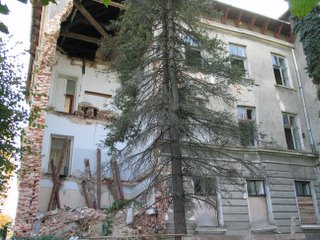
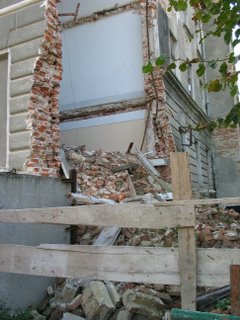 One of the culprits causing the occassional power-outtage:
One of the culprits causing the occassional power-outtage: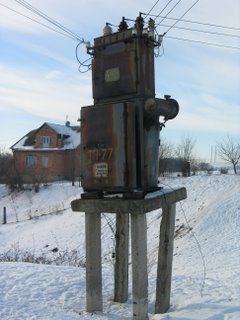
A typical road in Pidhajtsi:
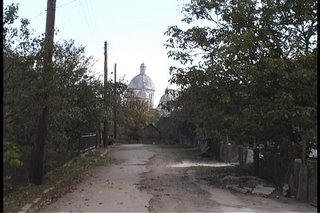
This photo is a still from some of my video footage; somehow I never managed to photograph the roads! This is Pidhajsti, and in the background is the dome of the Catholic Church for which my grandfather, who passed away three years ago this November, was the primary founder.






